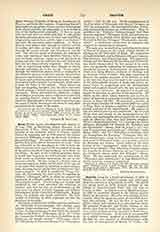

Graz, University of, located in the capital of the Province of Steiermark, owes its establishment to the Counter-Reformation and the efforts of Archduke Karl von Steiermark, who, in 1584, requested Pope Gregory XIII to grant autonomous university privileges to the Jesuit college of Graz, which had been founded in 1573 and was already possessed of a theological and philosophical school. The documents of the archducal foundation and of papal recognition are dated January 1, 1585. The latter, however, was not made public until April 15, 1586, the occasion being the dedication exercises of the institution as a university, and it bore the signature of the new pope, Sixtus V. The letter of recognition of Emperor Rudolf II followed soon after. The archduke endowed the seat of learning with a yearly income and set aside for its benefit a certain proportion of the products yielded by Government lands. The papal Bull directed the Jesuit priests in charge to give public instruction in theology, philosophy, and the liberal arts, as was customary in other advanced schools of a similar character. The first scholastic year of the university began in 1586.
Subsequent to the Counter Reformation, Archduke on Ferdinand signed on behalf of the institution which his father had created a second document of foundation, in which he confirmed its purpose as set forth in the original decree, declaring it to be “the service of the Holy Roman Catholic Religion“, and placed it on mano a solid material basis. He enriched it with new buildings and presented it with the revenues and full ecclesiastical supremacy of Muhlstatt, in Carinthia, and of other estates of the Crown, including the right of independent jurisdiction and exemption from the payment of duties and taxes. He obtained from Pope Clement VIII a confirmation of the Muhlstatt grant, with which the college of Graz had been given diocesan rights over the whole of that principality. He founded a burse for poor students, which was called the Ferdinandeum. Another and similar foundation was the Jose phinum, which was raised by private subscriptions (1743-49). It was not long before the cathedral chapter of Salzburg claimed for itself diocesan powers in the district of Muhlstatt; but a settlement was reached at a trial held in 1659, whereby on the one hand the ordinariate powers and independent jurisdiction of the college of Graz were recognized, while on the other certain concessions were made to the Diocese of Salzburg. Legal proceedings with the Karnten authorities regarding the exemption of the Muhlstatt district from property taxes, which proceedings lasted more than one hundred years, resulted in a defeat for the Jesuit Order in 1755.
This institution of Graz was the Jesuits’ center of activity in their labors for the reclaiming of Steiermark to Catholicity. Here was prepared all the material necessary for such a mission, here Catholic influence found a new source of strength in the founding of academic sodalities of Mary and other societies of like import. Its school festivals were celebrated with dramas of a spiritual as well as profane character and with farces and comedies in Latin and German, which were produced in the college theatre. The chief aim of these plays was to awaken sentiments of faith and patriotism, and they formed a notable addition to the dramatic literature of the day.
As early as the year 1604, Georg Stobaus von Palmburg, Bishop of Lavant, advocated the further broadening of the University of Graz by the addition to its staff of a faculty of jurisprudence. But though negotiations were undertaken to this end between the institution and the Government, the former’s insistence that its autonomy should remain unimpaired caused these negotiations to be suspended until the dissolution of the Jesuit Order. After the establishment, in Graz, of private courses in jurisprudence outside of the university, and the execution of a reform in theological and philosophical studies by the appointment of State Directors of Studies and the altering of examination methods, the university was placed in 1760 under the supervision of a State Commission of Studies designated for this purpose, and therefore lost almost entirely its monastic character of the Josephine period. The year 1773 proved to be, owing to the suppression of the Jesuits, the last school year of the Jesuit college at Graz. The university became a State institution, its material possessions were seized upon for the public treasury, and its course of instruction was remodeled to conform with that laid down by the newly established imperial Commission of Studies for the University of Vienna. The winter of 1778 saw the inauguration of a faculty of jurisprudence which consisted of two professors, while higher instruction in medicine was likewise introduced, which received gradual development. At the end of 1782 Joseph II issued a decree converting the university into a lyceum with four faculties and right to award degress in theology and philosophy. The number of instructors was restricted to twelve. But the Lyceum of Graz recovered in the summer of 1827 its former rank and name as a university, through a grant of the Emperor Francis. Its faculty of philosophy grew steadily, and a duly organized faculty of medicine was added by an imperial decree of January, 1863. The Alma Mater Grcecensis has since then occupied the third place among the institutions of learning in German-speaking Austria. The technical high school which had been founded in 1814 was taken over by the State in 1874.
KARL HOEBER

